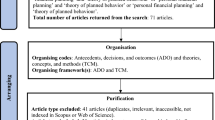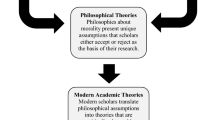Abstract
Based on a large international survey, we analyze how German-, French-, and Italian-speaking residents of Switzerland differ in their investment decision behavior and investment competence compared to their closest neighbors abroad who speak the same language. Although language may be closer to the individual self than country of residence, we find that there are greater similarities in the decision behavior of residents of Switzerland speaking different languages than there are between these and their linguistically closest neighbors abroad. These similarities hold also for the ability to avoid investment mistakes, which is stronger in all Swiss regions compared to the linguistically closest regions abroad. The Swissness in investment competence is more likely to be emotionally than knowledge driven and is associated with regional differences in the relationships with investment advisors.

Similar content being viewed by others
Notes
We chose the regions Baden-Wuerttemberg and Bayern in Germany, Lombardia, Piemonte, and Veneto in Italy, and Alsace, Franchecomte, and Rhone-Alps in France.
The market research agencies use panels comprising individuals who have agreed to participate in online surveys. The participating individuals have a variety of professional backgrounds and experience in various industries. The target participants receive information on the goal of the study, general information on the questions, and an estimate of the maximum amount of time required to answer the questions. Based on this information, participants decide whether or not to participate in the survey. Compensation is received upon completing the survey.
Principal component analysis indicates that investment experience is generally not limited to a particular asset class, and experience with different asset classes can be well summarized with one measure.
The Swiss Labor Force Survey is based on statements from about 4000 participants with permanent residence in Switzerland.
References
Acker, D., Duck, N.W.: Cross-cultural overconfidence and biased self-attribution. J. Socio Econ. 37, 1815–1824 (2008)
Barber, B.M., Lee, Y.T., Liu, Y.J., Odean, T.: Just how much do individual investors lose by trading? Rev. Financ. Stud. 22(2), 609–632 (2009)
Barberis, N., Xiong, W.: Realization utility. J. Financ. Econ. 104(2), 251–271 (2012)
Barber, B.M., Odean, T.: Trading is hazardous to your wealth: the common stock investment performance of individual investors. J. Finance 55(2), 773–806 (2000)
Behrman, J.R., Mitchell, O.S., Soo, C., Bravo, D.: How financial literacy affects household wealth accumulation. Am. Econ. Rev. 102(3), 300–304 (2012)
Blume, M., Friend, I.: The allocation of wealth to risky assets-the asset structure of individual portfolios and some implications for utility functions. J. Finance 30, 585–603 (1975)
Bowles, S.: Endogenous preferences: the cultural consequences of markets and other economic institutions. J. Econ. Lit. 36(1), 75–111 (1998)
Brinson, G.P., Hood, L.R., Beebower, G.L.: Determinants of portfolio performance. Financ. Anal. J. 42(4), 39–44 (1986)
Brown, M., Graf, R.: Financial literacy and retirement planning in Switzerland. Numeracy 6(2), 619–635 (2013)
Brügger, B., Lalive, R., Zweimüller, J.: Does Culture Affect Unemployment? Evidence from the Röstigraben. IZA Discussion Papers. Retrieved from (2009) https://doi.org/ideas.repec.org/p/iza/izadps/dp4283.html
Calvet, L.E., Campbell, J.Y., Sodini, P.: Measuring the financial sophistication of households. Am. Econ. Rev. 99, 393–398 (2009)
Charness, G., Levin, D.: When optimal choices feel wrong: a laboratory study of Bayesian updating, complexity, and affect. Am. Econ. Rev. 95(4), 1300–1309 (2005)
Chen, M.K.: The effect of language on economic behavior: evidence from saving rates, health behaviors and retirement assets. Am. Econ. Rev. 103(2), 690–731 (2013)
Esser, F., Umbricht, A.: Competing models of journalism? Political affairs coverage in US, British, German, Swiss, French and Italian newspapers. Journalism 14, 989–1007 (2013)
Eugster, B., Parchet, R.: Culture and Taxes: Towards Identifying Tax Competition. Cahiers de Recherches Economiques du Département d’Econométrie et d’Economie politique (DEEP) (2013)
Eugster, B., Lalive, R., Stienhauer, A., Zweimueller, J.: The demand for social insurance: does culture matter? Econ. J. 121, 413–448 (2011)
Fehr, E., Ho, K.: Introduction: tastes, castes and culture: the influence of society on preferences. Econ. J. 121, 396–412 (2011)
Feld, L.P., Kirchgassner, G.: Direct Democracy, Political Culture, and the Outcome of Economic Policy?: A Report on the Swiss Experience. Working Paper, University of St. Gallen (2000)
Gilovich, T., Wang, R.F., Regan, D., Nishina, S.: Regrets of action and inaction across cultures. J. Cross Cult. Psychol. 34(1), 61–71 (2003)
Goetzmann, W.N., Kumar, A.: Equity portfolio diversification. Rev. Finance 12, 433–463 (2008)
Henrich, J.: Does culture matter in economic behavior? Ultimatum game bargaining among the Machiguenga of the Peruvian Amazon. Am. Econ. Rev. 90(4), 973–979 (2000)
Hoff, K., Kshetramade, M., Fehr, E.: Caste and punishment: the legacy of caste culture in norm enforcement? Econ. J. 121(556), 449–475 (2011)
Kelly, M.: All their eggs in one basket: portfolio diversification of US households. J. Econ. Behav. Organ. 27, 87–96 (1995)
King, R.D.: Should English be the law? Atl. Mon. 279(4), 55–64 (1997)
Koestner M., Meyer, S., Hackethal, A.: Do Individual Investors Learn from Their Mistakes? SSRN Working Paper 2122652 (2012)
Kuo, M.-H., Chen, S.K., Chen, S.-S.: How to lessen the disposition effect? It pays to study before investing. Adv. Bus. Manag. Forecast. 9, 77–90 (2013)
Lehenkari, M.: In search of the underlying mechanism of the disposition effect. J. Behav. Decis. Mak. 16, 196–209 (2012)
Levin, I.P., Gaeth, G.J., Evangelista, F., Albaum, G., Schreiber, J.: How positive and negative frames influence the decisions of persons in the United States and Australia. Asia Pac. J. Mark. Logist. 13(2), 64–71 (2001)
Levinson, J.D., Peng, K.: Valuing cultural differences in behavioral economics. Psychology 4(1), 32–47 (2007)
Liu, Y.-J., Tsai, C.-L., Wang, M.-C., Zhu, N.: Prior consequences and subsequent risk taking: new field evidence from the Taiwan Futures Exchange. Manag. Sci. 56(4), 606–620 (2010)
Longchamp, C.: Drei Reaktionsweisen im Spannungsfeld von Moderne und Tradition: Eine Analyse polit-kultureller Konflikte in der Schweiz am Vorabend der Expo. 02. GfS-Research Institute, Bern (2002)
Lusardi, A., Mitchell, O.: The Economic Importance of Financial Literacy. NBER Working Paper 18952 (2013)
McRae, K.: Conflict and Compromise in Multilingual Societies: Switzerland. Wilfried Laurier University Press, Waterloo (1983)
Miauton, M.H., Reymond, A.: Der nationale Zusammenhalt: Mythus oder Realität? Ansichten der Leader und der Bevölkerung. M.I.S. Trend S.A., Lausanne, Lausanne (1998)
Nisbett, R.E., Peng, K.P., Choi, I., Norenzayan, A.: Culture and systems of thought: holistic versus analytic cognition. Psychol. Rev. 108, 291–310 (2001)
Nisbett, R.E.: The Geography of Thought. Free Press, New York (2003)
Odean, T.: Are investors reluctant to realize their losses? J. Finance 53, 1775–1798 (1998)
Schiendorfer, A.: Switzerland: the end of uncertainty. Credit Suisse Bull. 5 (2013) https://doi.org/www.credit-suisse.com/us/en/articles/articles/news-and-expertise/2013/12/en/switzerland-the-end-of-uncertainty.html
Shefrin, H., Statman, M.: The disposition to sell winners too early and ride losers too long: theory and evidence. J. Finance 40, 777–790 (1985)
Spina, R.R., Ji, L.J., Guo, T., Zhang, Z., Ye, L., Fabrigar, L.: Cultural differences in the representativeness heuristic: expecting a correspondence in magnitude between cause and effect. Personal. Soc. Psychol. Bull. 36(5), 583–597 (2010)
Stulz, R.M., Williamson, R.: Culture, openness, and finance. J. Financ. Econ. 70(3), 313–349 (2003)
Summers, B., Duxbury, D.: Decision-dependent emotions and behavioral anomalies. Organ. Behav. Hum. Decis. Process. 118(2), 226–238 (2012)
Tversky, A., Kahneman, D.: Availability: a heuristic for judging frequency and probability. Cogn. Psychol. 5(2), 207–232 (1973)
Vulkan, N.: An economist’s perspective on probability matching. J. Econ. Surv. 14, 101–118 (2000)
Wang, M., Fischbeck, P.S.: Similar in how to frame, but different in what to choose. Mark. Bull. 15, 13–24 (2004)
West, J., Graham, J.L.: A linguistic-based measure of cultural distance and its relationship to managerial values. Manag. Int. Rev. 44(3), 239–260 (2004)
Wright, G.N., Phillips, L.D.: Cultural variation in probabilistic thinking: alternative ways of dealing with uncertainty. Int. J. Psychol. 15(4), 239–257 (1980)
Yates, J.F., Ronis, D., Wang, D.: Probability judgment accuracy: China, Japan and the United States. Organ. Behav. Hum. Decis. Process. 43, 145–171 (1989)
Yates, J.F., Lee, J.-W., Shinotsuka, H., Patalano, A.L., Sieck, W.R.: Cross-cultural variations in probability judgment accuracy: beyond general knowledge overconfidence. Organ. Behav. Hum. Decis. Process. 74, 89–117 (1998)
Author information
Authors and Affiliations
Corresponding author
Additional information
We thank the Baloise Group for financial support in collecting the data. Comments provided by Christian Dreyer, Marc-Oliver Rieger, Mei Wang, Manish Gupta, Michal Dzielinski, the participants of the 2015 annual meeting of the Swiss Society of Economics and Statistics, and two anonymous referees are greatly appreciated.
Appendix
Appendix
1.1 A. Variable specifications
Financial income is the household’s net disposable income. We use the following equivalents:
-
\({\le }20{,}000\) Euro and \({\le }50{,}000\) Swiss franks
-
20,000–50,000 Euro and 50,000–100,000 Swiss franks
-
50,000–80,000 Euro and 100,000–150,000 Swiss franks
-
\({\ge }80{,}000\) Euro and 150,000 Swiss franks.
Financial wealth is the household’s net disposable wealth (without real estate) (e.g., cash, financial assets such as equities, bonds, funds, and pension savings such as 3a saving accounts used in Switzerland). We use the following equivalents:
-
\({\le }30{,}000\) Euro and \({\le }100{,}000\) Swiss franks
-
30,000–70,000 Euro and 100,000–200,000 Swiss franks
-
70,000–100,000 Euro and 200,000–300,000 Swiss franks
-
\({\ge }100{,}000\) Euro and 300,000 Swiss franks.
1.2 B. Further tests
Rights and permissions
About this article
Cite this article
Bachmann, K., Hens, T. Is there Swissness in investment decision behavior and investment competence?. Financ Mark Portf Manag 30, 233–275 (2016). https://doi.org/10.1007/s11408-016-0274-8
Published:
Issue Date:
DOI: https://doi.org/10.1007/s11408-016-0274-8




